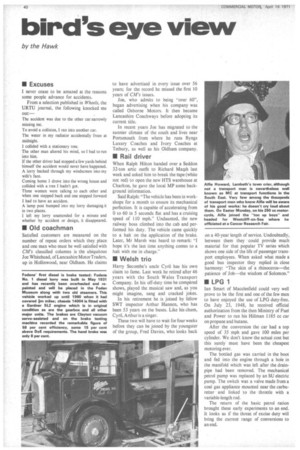bird's eye view
Page 42

If you've noticed an error in this article please click here to report it so we can fix it.
by the Hawk • Excuses
I never cease to be amazed at the reasons some people advance for accidents.
From a selection published in Wheels, the URTU journal, the following knocked me out:—
The accident was due to the other car narrowly missing me.
To avoid a collision, I ran into another car.
The water in my radiator accidentally froze at midnight.
I collided with a stationary tree.
The other man altered his mind, so I had to run into him.
If the other driver had stopped a few yards behind himself the accident would never have happened. A lorry backed through my windscreen into my wife's face.
Coming home I drove into the wrong house and collided with a tree I hadn't got.
Three women were talking to each other and when one stepped back and one stepped forward I had to have an accident.
A lamp post bumped into my lorry damaging it in two places.
I left my lorry unattended for a minute and whether by accident or design, it disappeared.
• Old coachman Satisfied customers are measured on the number of repeat orders which they place and one man who must be well satisfied with CM's classified columns is the ubiquitous Joe Whitehead, of Lancashire Motor Traders, up in Hollinwood, near Oldham. He claims to have advertised in every issue over 56 years; for the record he missed the first 10 years of CM's issues.
Joe, who admits to being over 60", began advertising when his company was called Osborne Motors. It then became Lancashire Coachways before adopting its current title.
In recent years Joe has migrated to the sunnier climate of the south and lives near Portsmouth from where he runs Byngs Luxury Coaches and Ivory Coaches at Tetbury, as well as his Oldham company.
III Rail driver
When Ralph Hilton handed over a Seddon 32-ton artic outfit to Richard Mach last week and asked him to break the tape (white not red) to open the new HTS warehouse at Charlton, he gave the local MP some background information.
Said Ralph: "The vehicle has been in workshops for a month to ensure its mechanical perfection. It is capable of accelerating from 0 to 60 in 5 seconds flat and has a cruising speed of 110 mph." Undaunted, the new railway boss climbed into the cab and performed his duty. The vehicle came quickly to a halt on the application of the brake. Later, Mr Marsh was heard to remark: "I hope it's the last time anything comes to a halt with me in charge."
• Welsh trio
Harry Secombe's uncle Cyril has his own claim to fame. Last week he retired after 46 years with the South Wales Transport Company. In his off-duty time he compered shows, played the musical saw and, as you might imagine, sang and cracked jokes.
In his retirement he is joined by fellow SWT inspector Arthur Hannen, who has been 53 years on the buses. Like his chum, Cyril, Arthur is a singer.
These two will have to wait for four weeks before they can be joined by the youngster of the group, Fred Davies, who looks back
on a 40-year length of service. Undoubtedly, between them they ' could provide much material for that popular TV series which shows one side of the life of passenger transport employees. When asked what made a good bus inspector they replied in close harmony: "The skin of a rhinoceros—the patience of Job—the wisdom of Solomon."
II LPG 1 Ian Smart of Macclesfield could very well prove to be the first and one of the few men to have enjoyed the use of LPG duty-free. On July 23, 1948, he received official authorization from the then Ministry of Fuel and Power to run his Hillman 1185 cc car on propane and butane.
After the conversion the car had a top speed of 35 mph and gave 100 miles per cylinder. We don't know the actual cost but this surely must have been the cheapest motoring ever.
The bottled gas was carried in the boot and fed into the engine through a hole in the manifold which was left after the drainpipe had been removed. The mechanical petrol pump was replaced by an SU electric pump. The switch was a valve made from a coal gas appliance mounted near the carburetter and linked to the throttle with a variable-length rod.
The return of the basic petrol ration brought these early experiments to an end. It looks as if the threat of excise duty will bring the current range of conversions to an end.




























































































